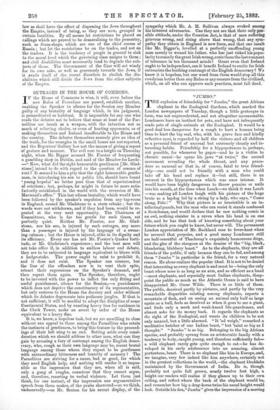OUTRAGES IN THE HOUSE OF COMMONS.
IF the House of Commons is wise, it will, even before the new Rules of Procedure are passed, establish another, enabling the Speaker to silence for the Session any Member guilty of any brutality of language which, in his judgment, is premeditated or habitual. It is impossible for any one who reads the debates not to believe that some at least of the Par- nellites use insult as a weapon, with the intention not so much of relieving choler, or even of hurting opponents, as of making themselves and Ireland insufferable to the House and the country. The debates themselves scarcely give an idea of the truth, for the wrangles in the small hours are not reported, and the Reporters' Gallery has not the means of giving a report of gesture and manner. The evil rose to a height on Thursday night, when Mr. Biggar accused Mr. Forster of frequenting a gambling shop in Dublin, and said of the Member for Leeds : —" Now, what did the right honourable gentleman [Mr. Glad- stone] intend to do with regard to the question of arrears of rent ? It seemed to him a pity that the right honourable gentle- man, in introducing his son to public life, should have found young hopeful' no better post than that of superintendent of evictions ; hut, perhaps, he might in future be more satis- factorily established in the world with the reversion cif Mr. Marwood's office." This last odious brutality, which would have been followed by the speaker's expulsion from any tap-room in England, roused Mr. Gladstone to a stern rebuke ; but the words were not withdrawn, and if they had been, would be re- peated at the very next opportunity. The Chairman of Committees, who is far too gentle for such times, sat perfectly quiet. Neither Mr. Forster, nor Mr. Glad- stone, nor his son, is injured by such outrages, any more than a passenger is injured by the language of a swear- ing cabman ; but the House is injured, alike in its dignity and its efficiency. Every one has not Mr. Forster's Quaker forti- tude, or Mr. Gladstone's experience ; and the best men will not take office if, in addition to endless labour and debate, they are to be subjected to language equivalent to blows with a hedge-stake. The power ought to exist to prohibit it, and it does not exist. The Speaker can censure, but the line of the offenders now is to vent their spite, retract their expressions on the Speaker's demand, and then repeat them again. The Speaker, therefore, ought to be invested with the power to inflict the only fitting and useful punishment, silence for the Session,—a punishment which does not deprive the constituency of its representative, but only restores to the House the decency and order without which its debates degenerate into pothouse jangles. If that is not sufficient, it will be needful to adopt the discipline of some Continental States, and by exacting heavy fees for residence in the Clock Tower, make an arrest by order of the House equivalent to a heavy fine.
It is, we know, a hopeless task, but we are unwilling to close without one appeal to those among the Parnellites who retain the instincts of gentlemen, to bring this feature in the proceed- ings of their left wing to an end. Setting aside every consi- deration which we should address to other men, what can they gain by arousing a fury of contempt among the English demo- cracy, who, rough as their own language may be, resent brutal language among those whom they expect to be gentlemen with extraordinary bitterness and tenacity of memory The Parnellites are striving for a cause, bad or good, for which they need English help, and nothing will render it so impos- sible as the impression that they are, when all is said, only a gang of roughs, conscious that they cannot argue, and, therefore, resorting to verbal violence. Let them just think, for one instant, of the impression one argumentative speech from them makes, of the praise showered—as we think, undeservedly—on Mr. Sexton for his recent display, of the sympathy which Mr. A. M. Sullivan always- evoked among his bitterest adversaries. Can they not see that their only pos- sible attitude, under the Coercion Act, is that of men suffering grievous wrong, and rising, above that wrong, that any sym- pathy they obtain in England is new force, and that one insult like Mr. Biggar's, levelled at a perfectly unoffending young man merely to wound his father, who has just risked his popu- larity to remedy the great Irish wrong, costs them the last remnant of tolerance in ten thousand minds? Grant even that Ireland ought to be independent, can it benefit Ireland to excite for Irish extremists the loathing contempt of the English democracy We know it is hopeless, but one word from them would stop all this rowdyism better than any Rules or any censure from the civilised, which, on all who can approve such practices, must fall dead.


































 Previous page
Previous page